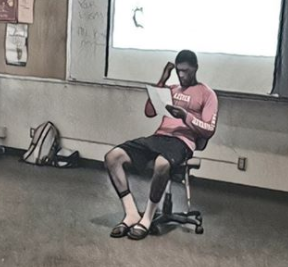In addition to finding quotes, developing writers need practice paraphrasing those ideas, rewording those quotes to illustrate how those sources fit into their own arguments.
To practice finding and paraphrasing quotes, I’ve been experimenting with the bulletin board application Padlet to record and share the intellectual labor students accomplish. My goal was to make the process less solitary and to help the entire class profit from each others’ work.
After we read and initially discussed chapter two of Paulo Freire’s Pedagogy of the Oppressed, I divided the class into groups. Each group tackled one of five topics we’d noted during those discussions: banking mode, problem posing, oppression/conformity, freedom/liberation, relevance/real life. I asked students to locate where Freire defined, clarified, or elaborated on those themes, urging them to look for quotes that they thought were especially meaningful or relevant.






